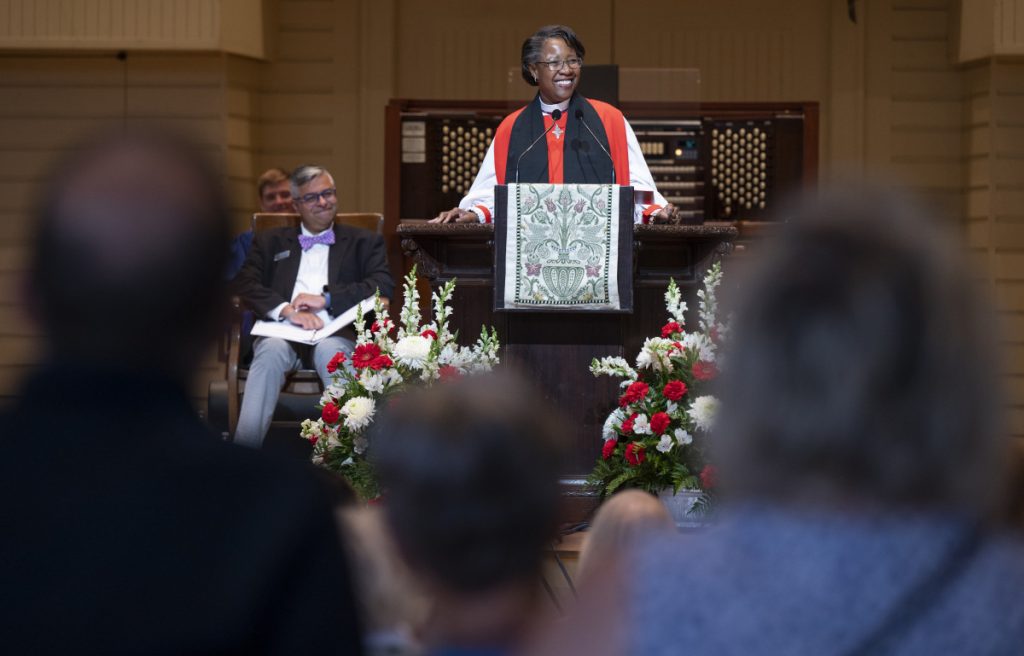MARY LEE TALBOT – STAFF WRITER

“Again? Again? The first thing I thought while reading this passage was, how often are crowds running out of food?” said the Rt. Rev. Jennifer Baskerville-Burrows. “We are so fixed on the miracle of making so much out of so little. Yet, once again, a great crowd gathered to hear Jesus.”
Baskerville-Burrows preached at the 9 am. Wednesday worship service in the Amphitheater. Her sermon title was “Again. And Again.” The Scripture reading was Mark 8:1-10.
She reminded the congregation that Mark’s is a very sparse gospel — yet he included the feeding of a crowd twice. The first time, in Mark 6:35-44, the crowd is in a deserted place listening to Jesus.
The disciples were running around, “too busy to eat and in their own hunger they went to Jesus and said, ‘Fix it; send them away to find food,’ ” Baskerville-Burrows said. “Jesus told them, ‘No, you feed them.’ The disciples found five loaves and two fish and fed 5,000 men with 12 baskets left over.”
In Mark 8:1-10, there is another crowd without food. This time Jesus shows concern for the crowd since they have been with him for three days. He could send them away, but some might not make it home. Again, the disciples did not know what to do, and Jesus, again, asked how many loaves were around; there were seven and a few small fish. They fed the crowd of 4,000 and had seven baskets left over.
“Why do these stories occur so closely in Mark?” Baskerville-Burrows asked. “Is it an accident of duplication, or is Mark trying to make a point with several versions of the same story? Mark is so sparing — so what is going on?”
She continued, “It is notable that in the second version, Jesus expressed concern for the crowd. They had been three days without food. When have you ever been three days with nothing to eat? Jesus took the problem to the disciples, and I imagine they would have learned. We have a world where multitudes are hungry and those with resources hold onto them.”
In the United States, she said, COVID-19 vaccines go unused while other parts of the world get nothing. “Those with the economic and social power horde and constrain until the marginalized roar — and it is getting too loud to ignore,” she said. “Jesus looks on us and says, ‘So what if you only have a little to offer? Offer it.’ ”
She asked the congregation to imagine they were part of the crowd. The crowd came again and again to hear Jesus. It took three days for them to feel the hunger, to be aware of the need for food, because they were getting food only Jesus can give.
The crowds went to the deserted places seeking respite from “the unrelenting grind that seems too much,” she said. “Jesus looked at, through, upon them with love, concern and sorrow. Jesus wants us to have what we need, and to share what we do have, as he shared so freely.”
There are always glimpses of hope, possibility and resurrection in the world. Some of them, she said, are in places like Chautauqua, where people grow in spiritual depth. “God help us if we forget they are also found in everyday places, like shopping, getting gas, in a neighborhood — even in a neighborhood where housing prices are not soaring, and people don’t have the means to move for a better job.”
Baskerville-Burrows said, “Resurrection is everywhere. We need to sit in the crowd and listen. While Jesus teaches, and the crowd presses in, we will know exactly what to do.”
The Rev. Natalie Hanson presided. Linda Stutz, a longtime member of the Motet Choir and Chautauqua Choir, read the Scripture. The prelude, played by Joshua Stafford, Jared Jacobsen Chair for the Organist and director of sacred music, was “Prelude on Rockingham,” by Hubert Parry. Members of the Motet Choir sang “Love Bade Me Welcome,” music by David Hurd and words by George Herbert. The postlude was Fugue in D Major, BMV 352 by Johann Sebastian Bach. The J. Everett Hall Memorial Chaplaincy and the Harold F. Reed Sr. Chaplaincy provide support for this week’s services and chaplains.




